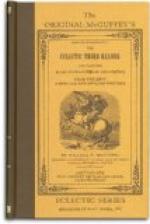[The Revision of 1878]
On April 9, 1878, the firm of Van Antwerp, Bragg & Co. determined upon making a new series of readers bearing the well-recognized title of McGuffey’s Eclectic Readers and distinguished as a “Revised Edition.” Some details of the plan as presented by the partner having literary matters in charge were agreed to. The method of teaching in the first reader was to be adjusted to a phonic-word method, and the gradation was to be improved. The selections of the older books were to be retained except where they could be improved.
In accordance with this resolution the editor invited four persons to aid, during the summer, in this work. These were Thomas W. Harvey of Painesville, Ohio; Robert W. Stevenson, of Columbus; Edwin C. Hewett, of Bloomington, Ill.; and Miss Amanda Funnelle, of Terre Haute, Indiana. Each was a teacher of wide experience.
To these assistants assembled in Cincinnati the plan of revision was fully explained and the work was alloted. Miss Funnelle and Mr. Stevenson took charge of the first three readers, Mr. Harvey and Dr. Hewett of the three higher books. All were perfectly familiar with the old books and in a few days substantial agreement was reached as to the changes needed. By two months of constant and intelligent labor the manuscripts assumed approximate form. The opening of the schools called the assistants back to their homes and the editor of the firm shaped the manuscripts for the text and procured the necessary illustrations. These were made, regardless of cost, by the best artists and engravers to be found in the country. When the plates were finished, the publishers printed several hundred copies of each of the three smaller books and distributed them as proofs to selected teachers in many states, asking them for criticisms and suggestions. The answers made were of great value. The First Reader was entirely re-written by the editor and the plates of other readers were made more perfect. In this revision the three lower books were almost entirely new. The Fourth was largely new matter, while in the Fifth and Sixth such matter as could not be improved from the entire field of literature, was retained. The Fifth and Sixth readers furnished brief biographies of each author and contained notes explanatory of the text. These were new features and they proved valuable at that date.
[Preparations for a Fight]
As soon as these books were completed, large editions were printed and they were most vigorously exploited not only to take the place of the older edition of McGuffey Readers, but to supplant the newly introduced Appleton Readers.
This book-fight was a long and bitter one. Every device known to the agency managers of the houses engaged was employed. Even exchanges of books became common. It was war; and like every war was carried on for victory and not for profit. It is perhaps fortunate that such contests cannot in the nature of things last long. In the long run business must show a profit or fail. Contrary to popular opinion, a book war is not profitable in itself; but it is a form of competition that has existed for fully a century. It presents no novelties even now.




